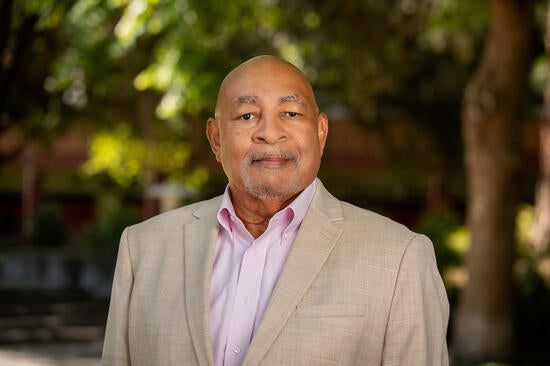UC Riverside students seeking careers in law can now get expert guidance to prepare for their academic path to law school and beyond.
A new campus program offers students information, advising, and support on topics such as planning for law school, what field of law they might want to pursue, and even if the legal profession is right for them.
The Pre-Professional Advising Center, previously known as the Health Professions Advising Center, expanded its program to add a pre-law advising counselor to its staff in May.
For almost 20 years, the center has helped guide and advise students interested in careers in the health professions. With the expansion to include law, it’s now the first University of California campus to offer preparation for both fields, said Charles Scruggs, director of the Pre-Professional Advising Center.
“There are many benefits to having a pre-law advisor on campus,” he said. “First and foremost, the creation of this new position will allow students in all colleges and schools to have a direct resource for assistance and discussion on law school and how to prepare and plan accordingly.”
The pre-law advising program will include many of the same elements of the health program, such as advising what type of pre-requisite courses to take, facilitating mentorships, and creating partnerships with related clubs and the professional legal community, Scruggs said. The center also plans hold panels, a fall quarter law school fair, and workshops for students.
Lawrance “L.A.” Edwards, who began working at the center on May 21 as the new pre-law adviser, has 22 years of litigation experience that includes working as a judge pro tem, prosecutor, public defender, private defense attorney, and civil litigator. He also trained trial attorneys and has 25 years of college teaching experience, most recently at Cal Poly Pomona.
“I have a perspective that is very eclectic and can talk to students about what all these areas in law look like, how there are different ways to look at the field,” Edwards said.
The new position is a joint venture between the College of Humanities, Arts, and Social Sciences, or CHASS, and the Division of Undergraduate Education.
“This new expansive commitment to pre-law advising and programming, and especially in partnership with CHASS, is bound to produce a more intentional pathway for students to pursue the various legal professions in the field,” said Louie Rodriguez, vice provost and dean of Undergraduate Education. “I am especially excited about the prospect of amplifying the number of legal professionals who can serve the Inland Empire and beyond.”
In December 2022, Undergraduate Education and the provost’s office began looking at law school applicant data among UCR students. They found that 192 students applied to law school in 2021 and 174 in 2022 but less than half matriculated. Many attended private non-ranked schools that could lead to heavy debt.
Responding to a survey, students said while UCR provided a rigorous undergraduate academic experience they struggled to understand the law school application process, preparing for the Law School Admissions Test, or LSAT, and how to approach selecting law schools.
“Until now, there has not been a central, campus-wide, pre-law advisor to inform, advise, and support UCR students who have an interest in the field of law,” said Robert Ream, associate dean of student success for Undergraduate Education. “Our new pre-law advising program will provide timely information, advising, and support to students preparing for advanced study in the fields of law.”
The data also showed that 78% of UCR law school applicants were CHASS alumni. The only pre-law preparation on campus has been through the college’s Law and Society program and major.
Law school students who graduate from a top 50 law school typically find jobs in the legal profession, Edwards said. The center’s goal is to help UCR graduates get admitted to those top law schools, finish in the top 25% of their classes, and obtain clerkships or other professional experiences that will help them succeed, he said.
Edwards said he is looking forward to discussing with students the variety of opportunities available in the legal profession that capitalize on different programs at UCR. For example, science, technology, engineering, and math, or STEM, majors are in demand for intellectual property law. Anthropology majors may want explore antiquities law while art majors might be interested in trademark law, he said.
As a first-generation college student who grew up in Compton and was the first black partner at a law firm that he worked at, Edwards wants to create opportunities for students from different backgrounds, including those underrepresented in law, to consider the field.
“For me, this is an opportunity to share and help students find their way into a profession that I still think is an honorable profession.” Edwards said. “That feeds my soul, knowing I’m helping students.”





